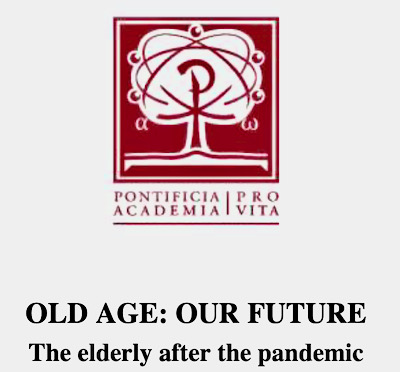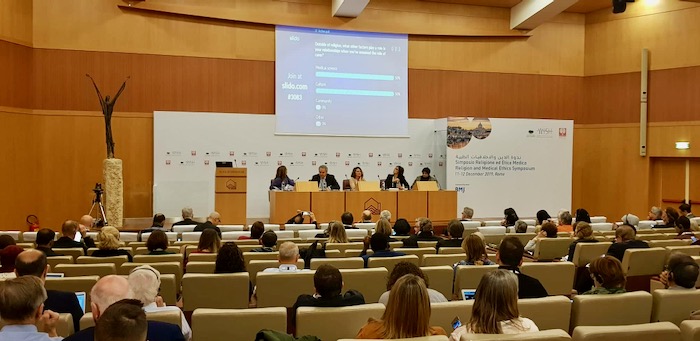Old Age, Our Future: Vatican expands on its global call for protecting the elderly

Wherever our journalistic colleagues are reporting around the world, one powerful connection between faith and life is the universal need for additional care as we all reach our final years.
As the IARJ’s co-managing director, and because I am based in Italy, I have been reporting for the IARJ on the Vatican’s leading role in trying to motivate faith-related institutions and communities around the world to focus on the global crisis in caregiving for the world’s elderly.
Since the outbreak of COVID19, governments have been focusing on ways to assist and support the most vulnerable members of society, especially the elderly, who have been the most affected by the pandemic on all continents. Not only are they more likely to suffer serious complications from COVID19, but they are also more vulnerable to the isolating effects and negative consequences of social distancing measures, including anxiety, emotional distress, loneliness, confusion, depression, cognitive decline.
How to Get the New Vatican Document

Protecting older adults has been a main goal for religious leaders and faith organizations, too. The Vatican has recently called for new attention to the treatment of older people as described in the 11-page OLD AGE: OUR FUTURE. The elderly after the pandemic, issued on February 9 by the Pontifical Academy for Life together with the Dicastery from Promoting Integral Human development.
The 11-page document covers a variety of issues related to the condition of the elderly during and after the pandemic, and calls global leaders to undertake significant reforms to build a new future for the elderly in society, rethinking the assistance model for them. What we need is a new vision, a new paradigm that helps society as a whole to care for the elderly,
reads the document, which draws on Pope Francis’s encyclical Fratelli tutti and is rooted in his culture of encounter
that pushes back against a throwaway culture
.
According to the European Office of the World Health Organization, up to half of the coronavirus deaths in Europe have occurred in in long-term care facilities, such as residential care homes. It is necessary to globally rethink society’s closeness to the elderly. Much needs to be reviewed in the care system for the elderly,
Monsignor Vincenzo Paglia, president of the Pontifical Academy for Life said at the press conference highlighting the need to involve society at all levels and take into consideration the cultural, anthropological and economic challenges brought by the demographic changes. A serious rethinking is needed not only in relation to residences for the elderly but for the entire care system of the numerous elderly population that today characterizes all societies.
The global crisis of an aging population and the efficiency of healthcare systems are high-priority topics to the Vatican’s Pontifical Academy for Life, which has previously contributed to the discussion in the global conference Religion and Medical Ethics Symposium,
focusing on palliative care and the mental health of the elderly. A year ago, I reported from that conference for the IARJ.

The new publication, OLD AGE: OUR FUTURE, echoes the earlier conference held in Rome by calling for a continuum of care between one’s home and appropriate external services, and stating the need to give more importance to the role of the caregiver, a profession that has been present in western societies for years
.
The future of the elderly and of society itself, can’t be separated from a shift in the perception of the elderly, who are to be considered as a gift from God and an enormous resource, an achievement to be safeguarded with care.
With this in mind, in the Vatican’s perspective the whole civil society, including modern social communications, should feel the responsibility to suggest and support new and targeted measures that make it possible for the elderly to remain in the homes they know and in any case in familiar environments that look more like a home than a hospital.
In its final recommendations the document addresses the dioceses, parishes, and all ecclesial communities, and invites them, for their part, to reflect more attentively about the great world of the elderly
, thus recalling the efforts by Popes in recent decades, to promote a more caring pastoral relationship with the elderly. That includes Pope Francis’s recent institution of the “World Day of Grandparents and the Elderly” which will be celebrated every year on July 25.
The document is only the latest of a series by the Pontifical Academy for Life and takes up the reflection started with the Note of March 30, 2020 (Pandemic and Universal Brotherhood), continued with the Note of July 22, 2020 (Humana Communitas in the Age of Pandemic: Untimely Meditations on Life’s Rebirth) and with the joint paper of December 28, 2020 in collaboration with the Dicastery for Integral Human Development (Vaccine for all. 20 points for a more just and healthy world).
Help Other Journalists and Share Your Ideas
Look around our IARJ website and you will find links to many global conversations we have organized among our colleagues about the impact of the pandemic on religion. Our mission is to help each other, as journalists, to share best practices, ideas and resources. Just as I have reported here on the important connections between faith and caregiving—we welcome ideas from other journalists as we try to report on the global impact of religion. Got questions or ideas? Please, contact us.
